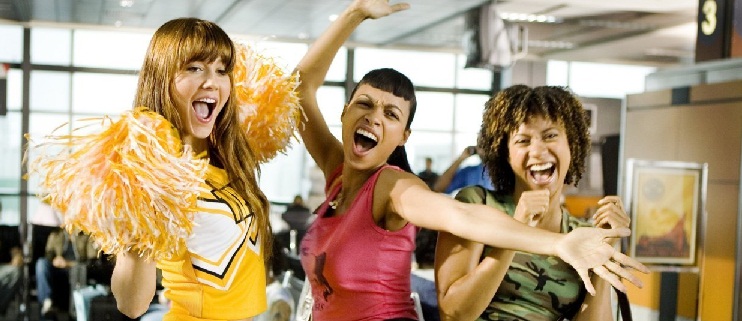
Last week, IndieWire’s Matt Singer wrote a pretty swell piece on Death Proof, specifically that it doesn’t deserve its label as Quentin Tarantino’s “worst film”:
At the time of “Grindhouse”‘s release, most of these overt nods to the bygone era of exploitation cinema were seen as little more than gimmicks. Just five years later, “Death Proof”‘s aged look feels far more poignant. With digital projection the new industry standard, it’s now a farewell not just to an obscure footnote in the history of cinematic exhibition, but to an entire century of celluloid filmmaking technology. All of Quentin Tarantino’s movies are stuffed with the love of movies, but “Death Proof” is the one most stuffed with the love of film, the tactile, physical medium that became the dominant art form of the twentieth century but was still anything but death-proof.
Until yesterday I thought Singer had merely given an interesting but contrarian take on the less interesting “Grindhouse” entry. How could a film this small, this gimmicky — even for a Tarantino picture — be anything but a disappointing sidestep in the director’s filmography?
As shown in Inglourious Basterds and most recently Django Unchained, Tarantino’s penchant for name-dropping flower child era actresses and TV shows your dad’s probably never even heard of has lent itself to the stories he’s telling. For all of its countless strengths, Pulp Fiction’s pop cultural obsessions occasionally veer into character devices. “Fox Force Five” makes for great conversation between Mia and Vincent, but does it help a fantastic film in any real way? Singer nails it on the head when writes about Death Proof’s heart-on-sleeve “love of film.” Its main title, “The Last Race” is a Jack Nitzsche composition ripped straight from the MST3K-worthy Village of the Giants — i.e. the cheesy low budget double features Tarantino and Robert Rodriguez were paying tribute to. The second group of girls (Zoe Bell and Tracie Thoms among them) and of course the creepily charming “Stuntman” Mike (Kurt Russell) profess their fondness for the days of cult car cinema, for the days of Dirty Mary, Crazy Larry and a time when the letters “CGI” stood for nothing more than a weird acronym from a Star Trek episode.
Tarantino flaunts his obvious disdain for digital filmmaking — as always, Death Proof was shot on film stock, and this time by the director himself — and his passion for old school production.
Apart from a single wire, there is no fakery at work when Stuntman Mike tries to ram Zoe Bell off the hood of that Challenger. And it’s also no coincidence that Bell, credited as “herself,” is the one doing the stunts, having served as Daryl Hannah’s double on Kill Bill. Tarantino shows us the old way of doing things, and it’s arguably better. Dangerous and terrifying, but better. So when Stuntman Mike jokes to Rose McGowan about being dumb enough to fall down some stairs and get paid for it, it comes from a real appreciation for practical effects and the crazy people who destroy their bodies to aid in the illusion.
And boy is Stuntman Mike crazy. When he surprises the first set of girls and recites Jungle Julia’s poem for “Butterfly” (Vanessa Ferlito), Ferlito acquiesces to the lap dance, but not out of obligation. Nor from the threat of being deemed too “chickenshit.” Ferlito makes it clear Mike’s car scares the shit out of her, yet she can’t resist falling for his bad boy charms all the same. It’s a devastating “be careful what you wish for” finger wag then when Stuntman Mike’s car tire permanently tattoos Ferlito’s face. Bad boys are bad for a reason.

Then again, the world has plenty of bad girls, too. Death Proof’s genius comes in its inversion of gender stereotypes, and as Tarantino transitions out of the grainy, scratched celluloid with a black and white gas station sequence, it’s clear this new batch of girls — the aforementioned Bell and Thoms, Rosario Dawson, and Mary Elizabeth Winstead — ain’t chickenshit. Dawson voices her heavy disdain for a slutty Daryl Hannah “stand-in fucker” she used to date. (see?) Tracy Thoms is plenty upfront about ramming the Challenger up Mike’s “bitch” ass. Oh and the girls are plenty resourceful and conniving, often to dickish lengths; when they leave Winstead as collateral for their fateful joyride, they play right to its owner’s sexual obsessions. These are strong, self-assured women, to be feared as much as ogled over.
That applies to both groups of girls, really. Jungle Julia (Sydney Poitier) has all the self-assuredness and swagger of Eli Roth, in his conviction that a “fucking bitch will drink anything” if he supplies the booze. As Poitier and her gal pals show, this might be true, but the one difference is they’re going to do what they want regardless of how many Jaeger shots a guy buys. And in comparison to Roth and Michael Bacall’s bar stool scheming, Poitier’s hair swingin’ and foot tappin’ are just a different brand of bravado. Ferlito places a moratorium on make-out length with her new hook up “Nate” and even has him dote on her hair mid-rainstorm, and Jordan Ladd’s Shanna will absolutely correct you if you call her “Shawna.” None of which should exclude the planned “girls only” cabin trip. In Death Proof, women can be sexy (see: foot promotion, accentuated butts in booty shorts), but they can also play with the big boys. In fact, the big boys seem kinda dumb.
iMDb is far from any definitive resource, but its easy voting system is a cheap use of populist criticism. So why exactly does Death Proof earn a respectable but uncharacteristic rating for its director? If I may be so bold, when compared to the excess of Kill Bill, the style of Pulp Fiction or the grungy cool of Reservoir Dogs, Death Proof feels smaller, less overt — and perhaps by that token, less stereotypically “Tarantino.” But behind the artificially scratchy celluloid and Sally Menke’s brilliant, bipolar editing there’s a wonderful takedown of male machismo, not to mention a sly jab at how that often comes packaged and sealed inside of gearhead culture.
Yes, Nitzsche’s “Last Race” does play over Death Proof’s opening titles, but Tarantino’s not adapting the song as an omen of Stuntman Mike’s fuel-injected rampage. No. There’s a rage that’s been building in these girls, and Nitzsche’s song is its clarion call.

